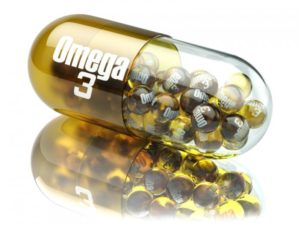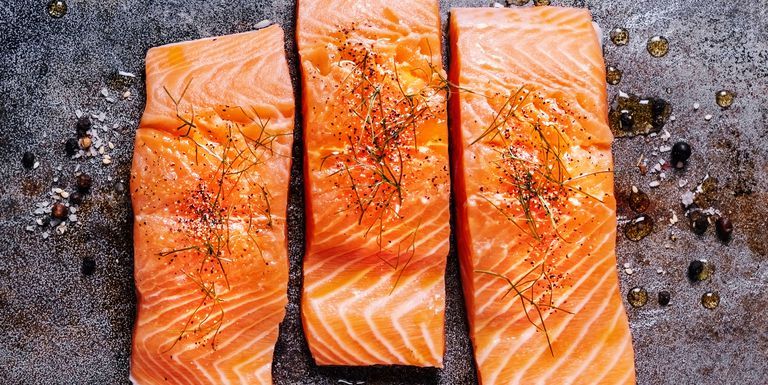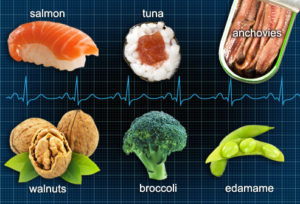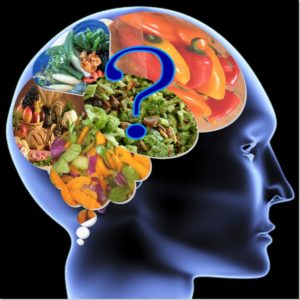Benefits of Omega-3s
Omega-3s are best known for their inflammatory-fighting properties. Since chronic inflammation is associated with serious diseases, omega-3s are constantly under the microscope for their potential ability to prevent and treat many ailments. “When it comes to omega-3s, the primary benefits are associated with EPA and DHA, not ALA,” says Rice. And don’t be mistaken, there are many perks associated with having sufficient omega-3s in your diet.
The American Heart Association recommends eating fish at least twice each week to build a healthy heart. As a matter of fact, evidence suggests that increased consumption of omega-3s from fish or fish oil supplements can decrease the rate of death by cardiac events and possibly strokes. Plus, omega-3s have been associatedwith reducing triglycerides and blood pressure—both of which are markers of overall heart health.
Researchers are also looking at the effects of omega-3s in cancer prevention and treatment. Some evidence proposes that omega-3 supplementation might reduce the occurrence of non-melanoma skin cancer, and other research advises omega-3 intake for its anti-inflammatory properties and beneficial effect on the immune system in breast cancer patients. Omega-3 intake is also considered a possible treatment for depression and anxiety.
Can Omega-3s Improve Your Performance?
With this nutrient’s host of health benefits comes a natural question: Can it also help me run faster and stronger? “Since running is a sport that puts added stress on the heart, lungs, and joints, inadequate intake of omega-3 EPA may contribute to reduced recovery of those systems,” says Jones.
In other words, a deficiency might hurt your running performance. How exactly a supplementation of omega-3s will help you is a different question. While there is limited research on the effects of omega-3s in athletic populations, there are still some potential benefits being examined, which include:
1. Oxygen Uptake
In a small study with elite cyclists, athletes supplemented with 1.3 grams of omega-3 twice a day for three weeks. The researchers found that this supplementation caused increased levels of nitric oxide in the blood and higher oxygen uptake, meaning that the athletes were better able to transport oxygen to muscles for use during exercise and consequently enhance performance.
[Smash your goals with a Runner’s World Training Plan, designed for any speed and any distance.]
2. Muscle Soreness
One of the key roles of omega-3s is increasing your muscles’ sensitivity to protein supplementation. Given that, researchers have looked into the benefits of combining omega-3s and protein in a postworkout supplement to reduce muscle soreness.
One study of rugby players showed moderate value to doing so, and another study of soccer players showed similar results. If you’re sidelined on the injury bench, you may also want to keep tabs on your omega-3s. A recent study published in the FASEB Journal suggests, they can stave off muscle loss when you have to press pause on your workout routine,
Yet, experts believe the jury is still out on this potential role for omega-3s. “While the potential for EPA/DHA to decrease muscle soreness is intriguing, the trial results to date have not been consistent,” Rice says. “Therefore, I don’t see the benefit of EPA/DHA for reducing muscle soreness as compelling.”
3. Asthma
Exercise-induced bronchoconstriction— a.k.a. asthma—is accompanied by swelling in the airways. Since omega-3s reduce inflammation, they are being studied for their potential role in treating exercise-induced asthma. “Asthmatic athletes may see benefits from omega-3s, as studies have shown a reduction in pro-inflammatory markers in these individuals when they supplemented with 3.2 grams of EPA and 2 grams of DHA daily for three weeks,” says Jones.

Should You Take an Omega-3 Supplement?
There seem to be substantial gains to be had by getting enough omega-3s in your diet with omega-3-rich foods such as walnuts, chia seeds, and flax seeds, fish and shellfish (think: salmon, lake trout, mackerel, cod, herring, sardines, anchovies and oysters), and seaweed) so you may not need to pop a giant pill everyday.
“If a runner currently meets the recommendation to eat two servings of fatty fish per week, they may be less likely to respond to the potential benefits of fish oil supplementation, as compared to a runner who rarely consumes fatty fish,” says Jones.
Unfortunately, only about one-third of the population meet the weekly fish recommendations. With that being the case, Rice suggests taking a daily omega-3 supplement to reap the benefits. As mentioned, the general recommendation is 500mg per day for a healthy person. If you have a medical condition, you should talk to your doctor before adding supplements to your routine or taking a higher dose. Remember that the supplement industry is not regulated, so look for an option that contains EPA and DHA and comes from reputable brands that undergo third party testing. NSF International tests supplements for purity and quality, and you can search brands that meet their criteria on their website.
A true love for sports





Recent Comments